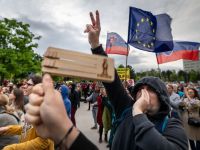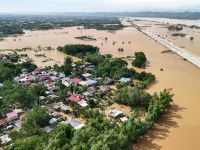Sanaa and Washington have agreed on the arrest of at least two people in Yemen suspected of belonging to Osama bin Laden's al-Qaeda terror network, Yemeni President Ali Abdullah Saleh was quoted as saying Sunday.
"There are suspicions around some people whose names have come up, and they are two or three people currently being followed by security services," Saleh said in an interview with the Asharq Al Awsat newspaper.
"They will be arrested ... because they are believed to be members of the al-Qaeda network" according to information provided by the United States, he told the London-based Saudi daily.
Saleh however denied that the suspects had links with the suicide bomb attack on the USS Cole warship in Yemen in October 2000 which left 17 US sailors dead.
"No, they have no hand in it. They are accused of belonging to the al-Qaeda network," he said in an interview from Paris where he met French President Jacques Chirac on Friday, following visits to Washington and Berlin.
Saleh had told a Kuwaiti newspaper last week that some 25 people had been arrested in connection with the USS Cole attack.
Saleh said in the Asharq Al Awsat interview that Yemen had delayed the suspects' trials, so as not to hinder the US investigation into the attack, whose primary suspect is Saudi-born bin Laden.
"Washington asked us to delay the trial in order to complete the investigation and get more information on elements it believes have taken part in this incident, and who are still at large outside Yemen," he said.
The United States also blames bin Laden for the September 11 attacks on New York and Washington and has been leading a war in Afghanistan where he is believed to be hiding.
Saleh denied that bin Laden could flee to Yemen.
"How can he get out (of Afghanistan) when it is besieged by US, British and other numerous forces," he said, adding "unless he had magic to allow him to move to such a far destination as Yemen."
Saleh said he had asked Washington to release 25 Yemeni nationals still being held by the Federal Bureau of Investigation in the United States on charges of breaking immigration laws.
US authorities "are now expected to release them," he said.
Saleh also said that Yemen had handed Interpol proof of the implication of Islamic cleric Abu Hamza al-Masri, a Briton of Egyptian origin, in kidnappings in Yemen that led to the killings of British and Australian nationals.
He said Yemen had "evidence, documents and tapes of telephone conversations in which Abu Hamza was giving orders to the Aden Army" militants.
Saleh said he expected London to cooperate with Sanaa and agree to extradite Abu Hamza to face trial in Yemen -- AFP
© 2001 Al Bawaba (www.albawaba.com)







